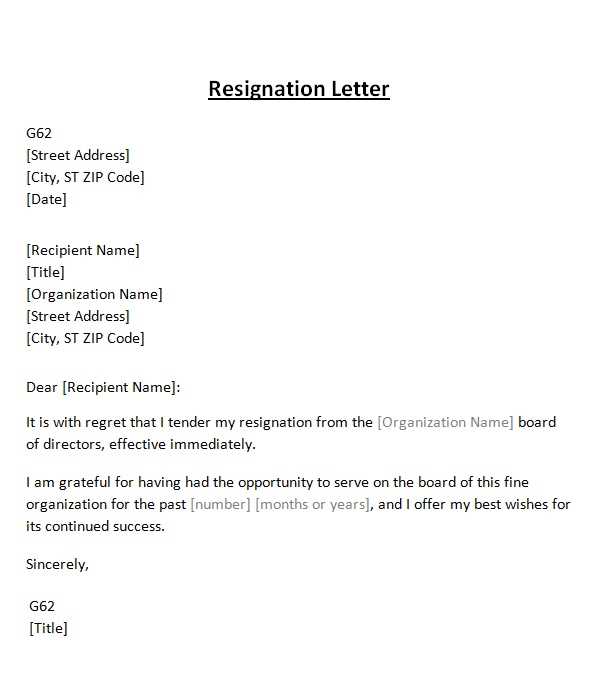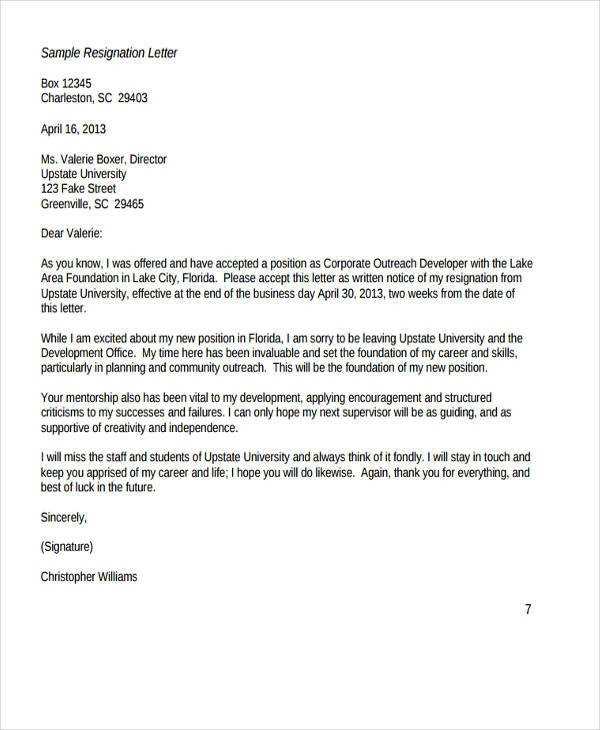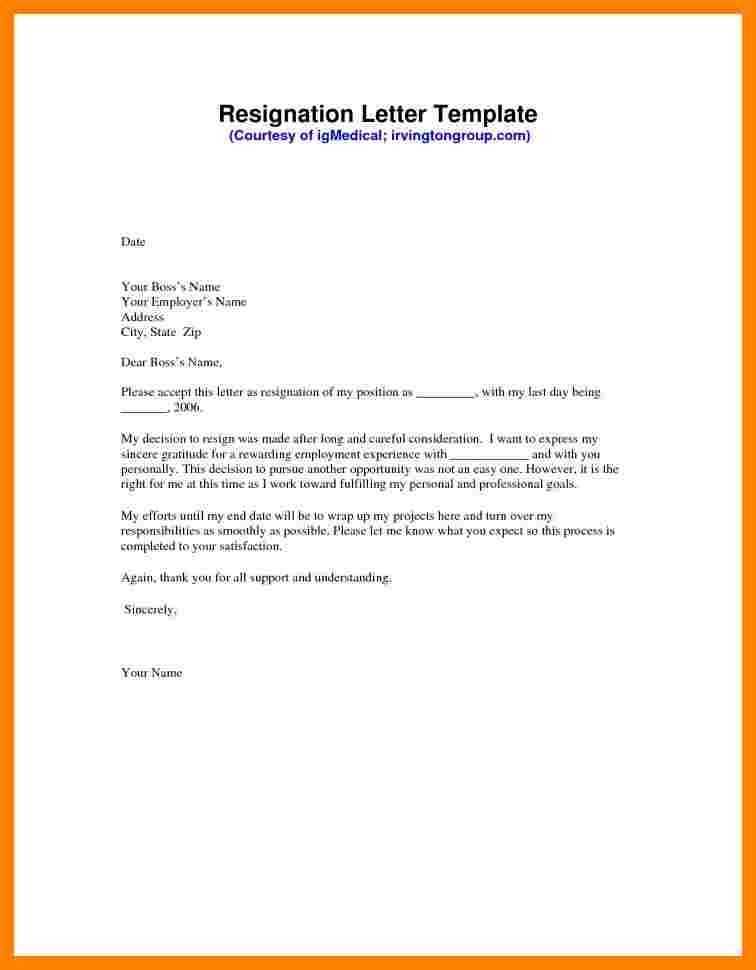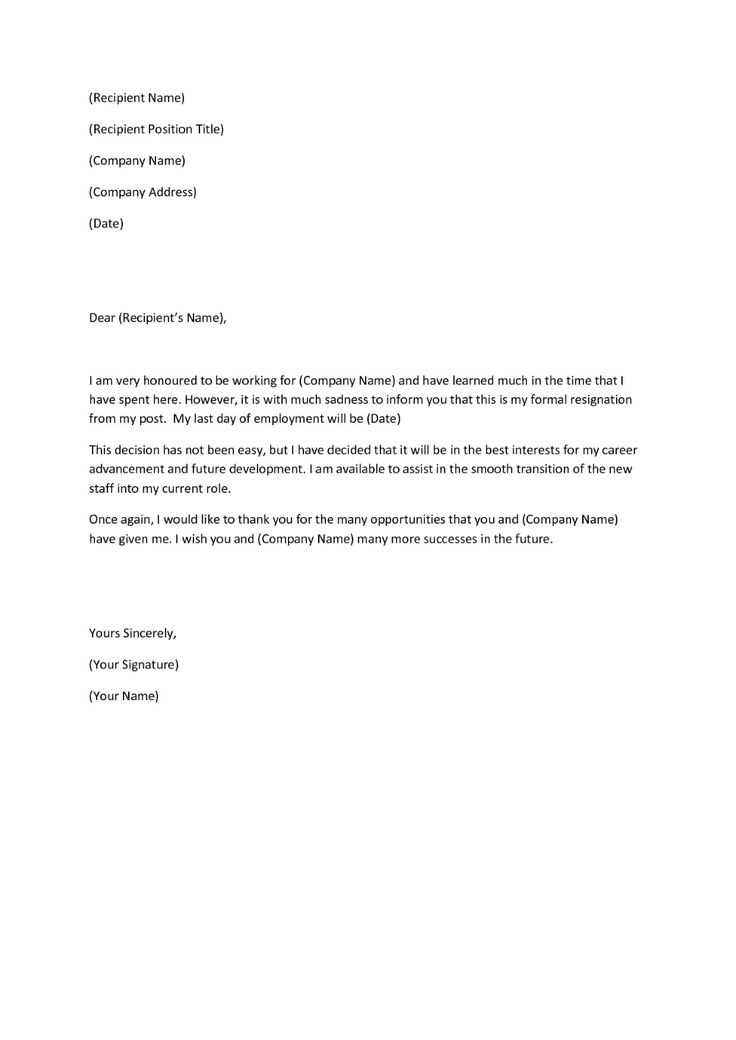Sample Board Resignation Letter Template for Easy Use

When stepping away from a leadership or key role, it’s essential to communicate your decision thoughtfully and professionally. A well-crafted message can help ensure a smooth transition and maintain positive relationships with your colleagues and the organization. This type of communication requires clarity, respect, and a clear expression of your reasons for leaving.
It’s important to express your gratitude for the experiences you’ve had and the relationships you’ve built during your time in the role. A carefully written notification not only helps in making your departure clear but also contributes to the organization’s ability to move forward effectively after your exit.
Writing an appropriate message that balances professionalism with personal appreciation can go a long way in preserving the reputation you’ve built. Your departure should feel like a natural progression rather than a disruption, and a well-constructed notice will ensure that your exit is seen in a positive light.
By taking the time to write a thoughtful and clear announcement, you can maintain your professional integrity and leave on good terms, ensuring a smooth handover of responsibilities.
Why Stepping Down from a Position Matters
Understanding the Significance of a Formal Exit
Leaving a key role in any organization is a significant decision that can impact not only the individual but also the entire team or company. When stepping away from such a position, it’s important to handle the departure in a way that reflects both professionalism and respect for the process. A formal announcement ensures that the transition is smooth and that those involved have clarity regarding the next steps.
By articulating your intent to leave clearly and respectfully, you help maintain the integrity of the organization. This formal notification allows for proper planning, such as finding a replacement or redistributing responsibilities, minimizing any potential disruption. Additionally, it offers a chance to express gratitude for the opportunity and acknowledge the contributions of others.
Ensuring a well-considered and professional exit demonstrates that you value both your role and the organization you’ve been a part of, leaving behind a positive impression. This thoughtful approach can be especially valuable when working with other leaders, stakeholders, or teams who may continue to rely on your previous work and decisions.
Crafting Your Departure Notification Effectively
Key Aspects of a Formal Exit from a Role
When deciding to step down from a position, it’s important to approach the process thoughtfully, ensuring that your communication is clear and professional. A formal notification should reflect your reasons for leaving, maintain positive relationships, and provide the necessary details for a smooth transition. A well-crafted document sets the tone for the future, leaving a lasting impression on both your colleagues and the organization.
Essential Elements to Include
Your departure notice should include several key components to ensure it is effective and respectful. Consider the following:
- Clarity of Intent: Clearly state your intention to step down, including the effective date of your exit.
- Gratitude and Acknowledgment: Express appreciation for the opportunity and acknowledge the contributions of your colleagues or team members.
- Reason for Leaving (Optional): If appropriate, briefly mention the reason for your departure. This can help others understand your decision.
- Support for the Transition: Offer assistance in making the transition smoother by suggesting potential successors or helping with ongoing projects.
Maintaining Professionalism and Respect
Even if the reasons for your departure are personal or sensitive, it’s important to maintain a respectful and professional tone. A formal exit is not only about leaving a role, but also about preserving relationships and ensuring the continued success of the organization. Your communication should reflect maturity and gratitude, leaving the door open for future collaboration.
By following these guidelines, you create a constructive and graceful exit, one that ensures your professional integrity remains intact and leaves a positive impression with your colleagues and the organization as a whole.
Common Pitfalls to Avoid When Stepping Down
How to Uphold Professionalism During Departure
Leaving a position, especially in a leadership role, requires careful consideration. The way you exit can impact your reputation and future opportunities. It’s important to approach the situation with respect and professionalism, while avoiding common mistakes that could tarnish your legacy. By being mindful of potential pitfalls, you can ensure your departure remains smooth and your relationships intact.
Avoiding Negative Language and Unnecessary Criticism
One of the most damaging things you can do during a departure is to speak negatively about the organization, colleagues, or leadership. While personal grievances may exist, airing them during your exit can create an atmosphere of bitterness. Instead, focus on expressing gratitude and offering constructive feedback, if necessary, in a private and respectful manner.
Not Giving Enough Notice

Timing your exit is essential. Failing to provide adequate notice can leave your team or colleagues in a difficult position. It’s best to follow standard protocols and provide enough time for a smooth transition. Giving ample notice allows the organization to plan accordingly and ensures that your departure is as seamless as possible.
Leaving Without a Transition Plan
Avoid the mistake of leaving without helping the organization plan for the future. Whether it’s identifying a successor or ensuring ongoing projects are properly handled, it’s vital to assist with the transition process. Leaving without clear instructions or without offering assistance can leave your team scrambling to fill gaps.
Overlooking the Importance of Follow-Up
Once you’ve stepped down, it’s important to stay in touch, particularly if you’re leaving a position of influence or responsibility. Regular check-ins or offering continued support can help maintain your professional relationships. Neglecting this part of the process could cause any remaining goodwill to fade quickly.
By avoiding these pitfalls, you can leave your role gracefully and maintain the respect of your colleagues, ensuring that your professional reputation remains strong even after you’ve moved on to new opportunities.
Best Practices for Writing a Respectful Exit
Tips for a Clear and Concise Statement
When leaving a professional position, crafting your departure message thoughtfully is essential. A well-composed note ensures that you communicate your decision clearly, while maintaining professionalism and respect. The goal is to leave on good terms, preserving relationships and upholding your integrity as you move on to new opportunities. Below are some tips on how to approach this communication effectively.
Keep it Short and Professional

One of the most important things to remember when crafting your message is to be concise. Keep your message short, focused, and direct. Avoid including excessive details about your decision or venting frustrations. A simple statement of your departure with an appreciation for the opportunity and your time spent will suffice. This approach maintains respect while delivering the essential information.
Express Gratitude and Appreciation

Regardless of the circumstances of your departure, expressing gratitude can go a long way in ensuring that your exit remains amicable. Acknowledge the opportunities, growth, and experiences you gained while in the role. Thanking those you worked with shows respect and appreciation, which can positively influence how others view your departure and your professional reputation.
By adhering to these best practices, you ensure your exit is as professional and respectful as your time in the position, helping to maintain strong relationships for the future.